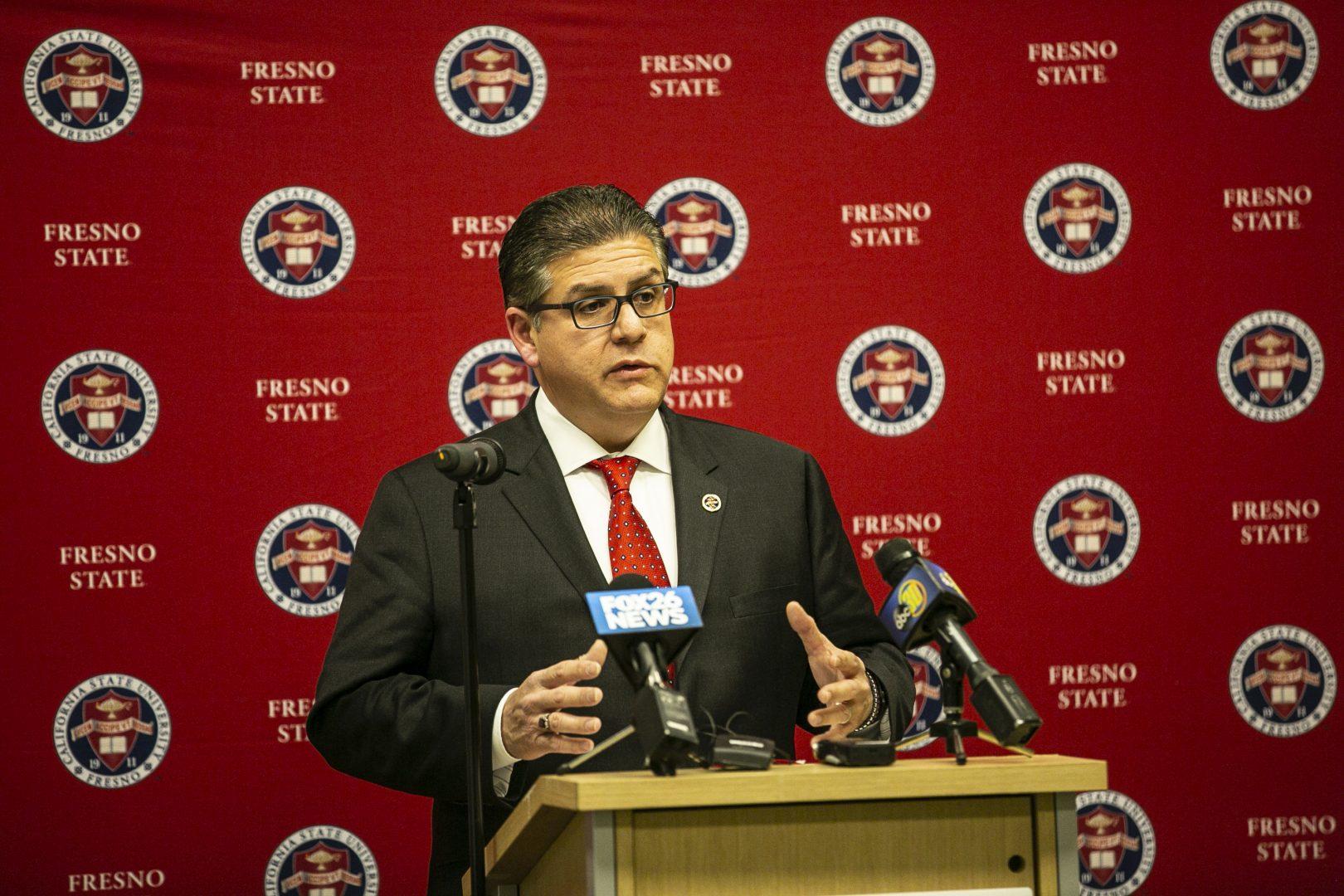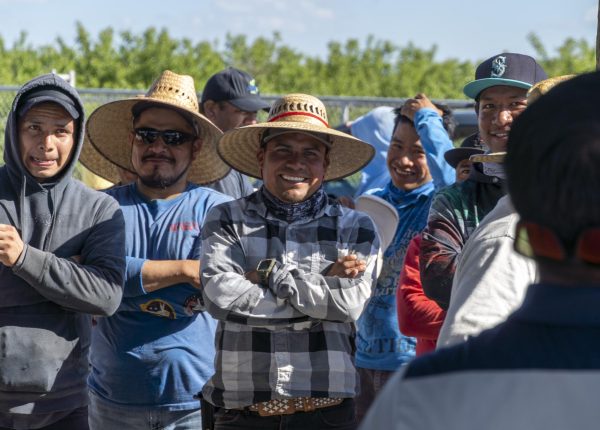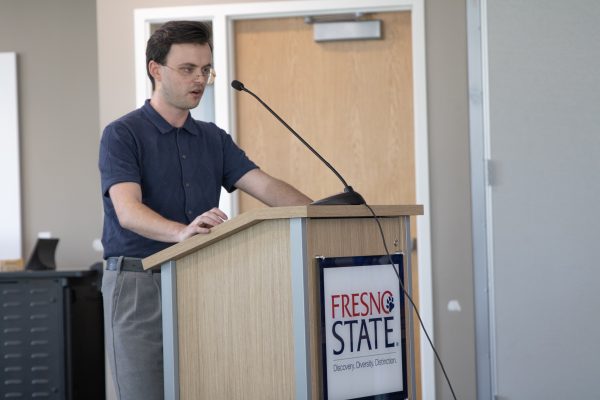Faculty union calls for retreat rights reform after Castro receives tenure position at Cal Poly
Former Fresno State president Joseph I. Castro addresses the media in the Library on March 12, 2020. (Larry Valenzuela/ The Collegian)
Oct 25, 2022
In September, former Fresno State president Joseph Castro utilized his retreat rights as former California State University (CSU) chancellor to become a tenured professor at Cal Poly San Luis Obispo next year.
Retreat rights are contractual guarantees within a CSU administrators’ contract for former faculty who gave up tenure for a higher position. If an administrator wanted to return to a teaching position, it’d be an executive right to retreat as a tenured professor.
Despite the CSU Board of Trustees’ announcement to investigate retreat rights in March, the California Faculty Association (CFA) has called for reform on executive perks, according to Fresno State professor Diane Blair.
“That includes what we think is sort of a mislabeling of retreat rights that allows executives like Castro to retreat into the classroom,” Blair said.
CSU has not made it clear to CFA if any changes have been made, she added.
Blair is the CFA secretary, which is a statewide officer position. CFA is the union for professors, lecturers, librarians, counselors and coaches on the 23 CSU campuses.
The union has been calling for reform because Castro was never a professor, never taught at Cal Poly and resigned because he mishandled Title IX cases, Blair said. She believes this should not qualify him to use his retreat rights.
“His executive perks basically are allowing him, after he had to resign in disgrace, to go and be a fully tenured professor at a CSU institution that he’s never worked at before; in a college and a department that he’s never worked in before,” Blair said. “Where he will be a professor of leadership and public policy, a position he’s never held before. So how [does] this qualify as a retreat right? Doesn’t make any sense to me.”
She also said that this is a larger problem in the CSU system because executives can misuse these perks, and it shows a lack of accountability for people in higher positions.
This is also why other Fresno State professors like Kenneth N. Hansen said he wasn’t surprised when he heard the news about Cal Poly.
“Somebody who’s never gone up for tenure, who doesn’t have much teaching experience. All of a sudden, they get this cushy job afterward? That is a little problematic,” Hansen said.
Hansen said he’d have no problem if an administrator like current Fresno State President Saúl Jiménez-Sandoval used retreat rights because he was a former professor.
Retreat rights were initially intended for faculty who followed the tenure track to move up in their career in administration, like a dean, according to Blair.
Hansen used Jiménez-Sandoval as an example because he was a tenured professor who moved up to dean, then provost and finally president.
Other Fresno State professors, like Thomas Holyoke, agreed with Hansen and weren’t surprised by the news. However, Holyoke said he was irritated Castro would be teaching a subject regarding ethics in policy after he supported “another administrator who seems to have had no ethics at all,” referring to Frank Lamas.
Holyoke agreed with Blair that changes in the retreat rights policies need to be made. Retreat rights are negotiable, so it had to be approved by former CSU chancellor Timothy White and the CSU Board of Trustees, despite Castro never teaching in the CSU system.
Blair said Castro’s retreat rights were “misappropriated” and used as an “incentive to hire executives” because he never taught in the CSU system or followed that tenure track.
“It’s demoralizing… I think it’s very demoralizing to faculty who feel like there is no accountability for executives in positions of power in the CSU right now,” she said.
Other faculty like Hansen and Holyoke said it would’ve made more sense if Castro retreated to a lesser position within the CSU or returned to a student service position because his background is solely in administration.
“It’s clear that… the CSU Board of Trustees has basically been generating these sort of ‘sweetheart deals’ for executives for years. In some cases, they are allowed, when they retire or resign, to become a consultant at our universities. And they get paid an exorbitant salary,” Blair said.
Blair used former Fresno State president John D. Welty as an example, who took a CSU consultant position after his presidency after retiring, according to her. She said this is another reason reform needs to happen because CSU pays millions of dollars to executives after they resign or retire.
An executive who did not do their job well or resigned because of a controversy like Castro should not receive a tenured professor position. She also added that there shouldn’t be these other guarantees in their contracts and instead need to be held at some ethical standard.
Hansen shared similar sentiments with Blair.
“I think if someone is dismissed for cause, then they probably should not have retreat rights… If they abuse their power, or if they refuse to faithfully carry out their duties and allow people to engage in bad behavior and even break the law, which is what Frank Lamas was accused of doing, then I don’t think there should be a cushy job afterward,” he said.
Hansen said if an administrator has retreat rights to a certain department, that department should have refusal rights in their contract as well. He said new hires, even if they’re part-time, must go through an evaluation process and are reviewed every semester.
He said he would’ve preferred to see Castro go through that process rather than be offered a tenured position.
“If there was a process, maybe [Castro] would still be hired and invited to join the department. And as far as I’m concerned, that’s all fine because I think he can do the job. [But] that’s not the issue that I have… What about the next guy who has no teaching experience whatsoever?” Hansen said.
Holyoke also said he’d like to see more input from the faculty when it comes to retreat rights.
“I think administrators should only have retreat rights to either a department that originally gave them tenure in the CSU or I suppose there could be retreat rights back to a department where the faculty in that department had voted to approve them giving retreat rights to that administrator,” he said.
CFA is currently working with the Cal Poly chapter, hearing faculty’s concerns with the Castro decision, Blair said. They had no input on whether or not Castro should join and had to accept the fact he’d be teaching there, she said.
This is why there have been calls for reform because it’s an issue with the CSU system, Blair added.
“This is a very common practice in the CSU. Even in cases where presidents or chancellors have had to resign because of inappropriate behavior or mishandling of situations, they still get as a part of their contracts these sorts of payouts, so it’s not just Castro. It’s a larger problem,” she said.


















